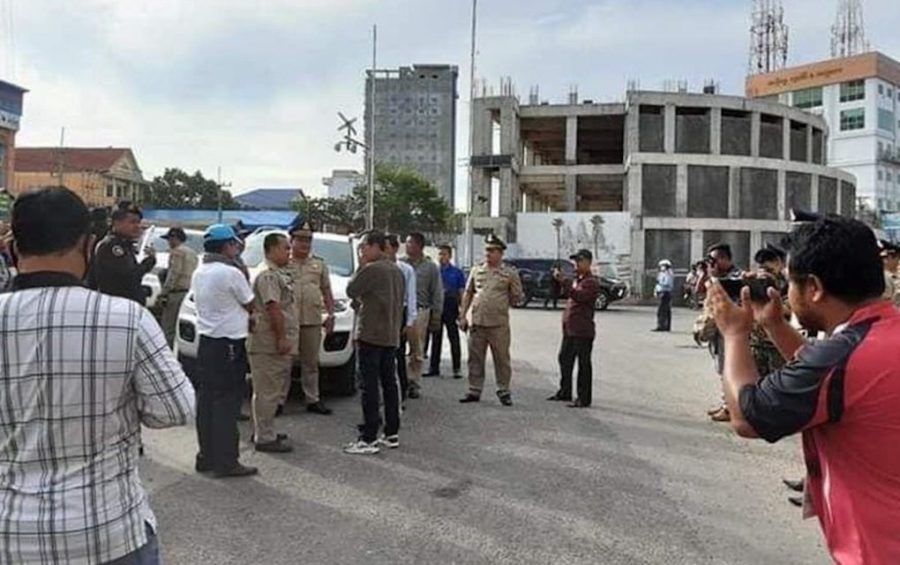The leader of an informal workers’ union in Poipet City said excessive security forces were deployed throughout the city as a “threat” after his request to hold a demonstration over border crossing restrictions next week was denied.
Din Puthy, head of the Cambodia Informal Economy Reinforced Association, told VOD on Wednesday that authorities deployed forces around Poipet City, with about 25 security guards patrolling near his house in the city on the Thai border.
Puthy said he saw the increased presence of authorities and state surveillance as a threat.
“This deployment is a threat to [union members’] feelings and spirits,” Puthy said. “They are monitoring us, and they are afraid that we will assemble our members. This morning, some [union] members came to my house, but they dared not enter because there were so many security forces.”
He said he noticed forces patrolling near his home on Wednesday, two days after he submitted a request to hold a seven-day protest starting on June 1.
Provincial police chief Ath Khem rejected Puthy’s accusations and said the deployment of security forces in the city was to ensure public order.
“He asked permission to hold a demonstration and the provincial [government] issued a notice, informing him that he was not allowed. No one deployed forces at his house,” Khem claimed. “What position is he holding that he needs to be protected?”
In 2016, Puthy, then also the outlawed opposition CNRP’s deputy head of operations in Poipet, was detained on charges of aggravated intentional violence after authorities accused him of driving his SUV into border police officer Chhean Pisith. But video footage and eyewitness accounts revealed Pisith fell to the ground before Puthy’s car could hit him, resulting in the officer being mocked online for “acting” and flopping in front of the vehicle.
On Monday, Puthy’s informal economy association submitted a letter to Banteay Meanchey provincial governor Um Reatrey stating that over the course of next week, about 1,500 people would gather to call for the Cambodia-Thailand border to reopen to people, including Rong Kleu market vendors, cart-pushing porters and drivers of taxis, tuk-tuks and motorbikes.
The union said if Thailand did not allow Cambodian pedestrians, carts and vehicles to enter Thailand’s Sakeo province from Cambodia, authorities should close the Cambodian side of the border to goods entering from Thailand, according to the letter, which was signed by Puthy.
The unionist also raises concerns that Cambodian vendors who have goods stored at the Rong Kleu market will not be able to sell their products, worth hundreds of thousands of dollars, before they expire or are damaged by water, rats or insects.
Puthy claims that while the Poipet border crossing is still closed, some Cambodians were bribing Thai authorities to gain entry to Thailand through illegal crossings, which raised the risk of Covid-19 transmission. He added that the opening of the border gate would help reduce illegal crossings.
The provincial government issued a statement later on Monday rejecting the union’s request for a demonstration and noting the authorities’ actions were intended to prevent coronavirus transmission amid the Covid-19 pandemic.
Puthy, also known as Mang Puthy, said he and union members would not protest after hearing the government’s response, but the public had the right to protest if they so desired.
“I changed my mind because I had informed the provincial hall, and the provincial hall issued a letter rejecting my request,” Puthy told VOD on Wednesday.
“I should not participate and the association will also not participate, but people can still keep holding the demonstration,” he added.
Soeng Senkaruna, spokesman for the human rights organization Adhoc, urged authorities to focus their energy on trying to find a solution for the people who planned to demonstrate, rather than increasing security measures.
“This is an issue because [people] try to demand a solution to the economic crisis or the challenging living conditions that they are facing because there is nothing they can do for their livelihoods,” Senkaruna said. “For these issues, I think all relevant authorities should conduct a survey of the issues [people] are facing in order to find solutions for them.”
(Translated and edited from the original article on VOD Khmer)













